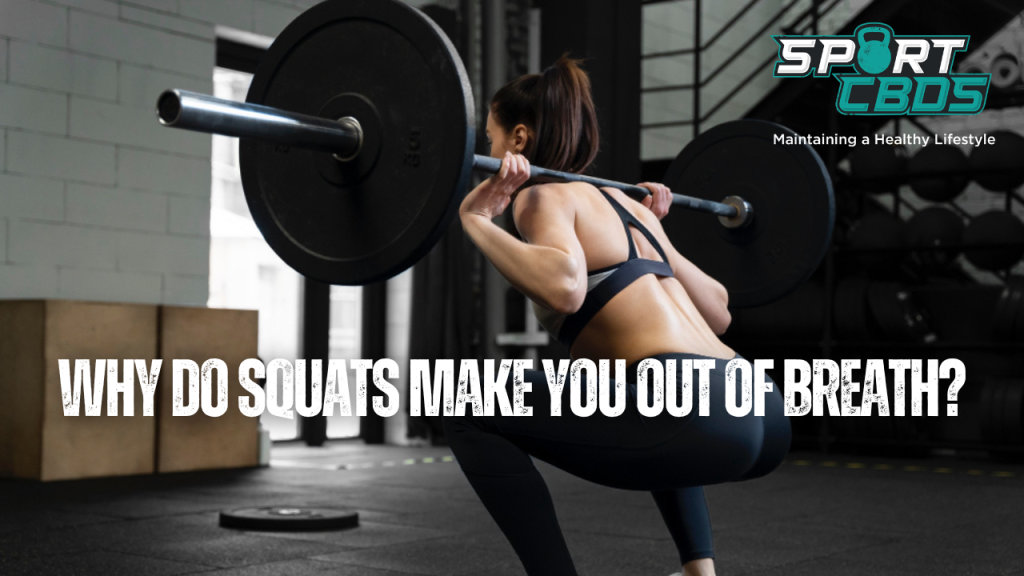
Why Do Squats Make You Out of Breath? Unraveling the Mystery
Squats, a staple in most fitness routines, are renowned for their ability to build strength and endurance.
However, they are also notorious for leaving us gasping for breath. Why do squats make you out of breath? This question is not only common but also crucial for understanding the physiological responses during this exercise.
By delving into the science behind squats and breathlessness, we can enhance our workout performance and ensure safety.
Why Do Squats Make You Out of Breath?
Squats make you out of breath due to the high oxygen demand of the muscles engaged during the exercise, primarily the quadriceps. As a compound exercise, squats involve multiple muscle groups working simultaneously, which requires a significant amount of energy. This energy, in the form of ATP (adenosine triphosphate), is produced in the muscle cells through a process that requires oxygen. As the intensity of the exercise increases, so does the oxygen demand, leading to faster and deeper respiration. Additionally, squats cause a rapid increase in heart rate as the heart needs to pump more blood to transport the required oxygen to the working muscles. This combination of increased respiration rate and heart rate is what makes you feel out of breath during and after performing squats.
The Science Behind Squats and Breathlessness
Squats are a compound exercise, meaning they engage multiple muscle groups simultaneously. The primary muscles involved are the quadriceps, the large muscle group at the front of your thighs. However, squats also engage your glutes, hamstrings, and even your core muscles to a certain extent.
When you perform a squat, your muscles require energy to contract and relax. This energy comes from a molecule called ATP (adenosine triphosphate), which is produced in your muscle cells through a process that requires oxygen. The more intense the exercise, the more oxygen your muscles need to produce ATP.
During squats, your quadriceps and other engaged muscles demand a significant amount of oxygen. This demand increases your respiration rate, making you breathe faster and deeper. This is your body’s way of getting more oxygen into your bloodstream and transporting it to your working muscles.
Oxygen Demands
However, if the oxygen demand surpasses your body’s ability to supply it, your muscles start producing ATP through a process called anaerobic respiration. This process doesn’t require oxygen but produces lactic acid as a byproduct, which can contribute to muscle fatigue and the burning sensation you might feel during intense exercise.
In addition to the increased oxygen demand, squats also cause a rapid increase in heart rate. This is because your heart needs to pump more blood (which carries the oxygen) to your working muscles. The combination of increased respiration rate and heart rate is what makes you feel out of breath during and after performing squats.
Understanding this science is crucial as it helps us realize that getting out of breath during squats is a normal physiological response. However, if you find yourself excessively out of breath, it might be a sign that you need to improve your cardiovascular fitness or adjust your squatting technique. In the next section, we’ll explore the importance of proper breathing during squats and how it can enhance your performance and safety.
The Importance of Proper Breathing During Squats
Proper breathing is a crucial yet often overlooked aspect of performing squats. It not only helps meet the oxygen demand of your muscles but also contributes to your overall performance and safety.
One common mistake people make is holding their breath during squats. While it might seem like a natural response, especially during heavy lifts, it can be dangerous. Holding your breath, also known as the Valsalva maneuver, can lead to a dramatic increase in blood pressure.
This can put undue stress on your cardiovascular system and potentially lead to dizziness or fainting. Therefore, it’s essential to breathe continuously throughout the exercise.
Diaphragmatic Breathing
Diaphragmatic breathing, or “belly breathing,” plays a significant role in squats. This type of breathing involves the diaphragm, a large muscle located between your chest and abdomen. When you breathe in, your diaphragm contracts and moves downward, allowing your lungs to expand and fill with air.
When you breathe out, your diaphragm relaxes and moves upward, pushing air out of your lungs. Diaphragmatic breathing is more efficient than chest breathing as it allows for deeper, fuller breaths. This can bring more oxygen to your blood and improve muscle function, enhancing your squat performance.
Chest breathing, on the other hand, involves shallow, quick breaths that primarily expand and contract the chest. This type of breathing is less efficient as it doesn’t fully utilize the lungs’ capacity, leading to less oxygen intake. During squats, it’s recommended to practice diaphragmatic breathing to meet the high oxygen demand of your muscles.
Here are some tips for practicing diaphragmatic breathing during squats:
- Stand or sit upright.
- Place one hand on your chest and the other on your abdomen.
- Breathe in deeply through your nose, letting your abdomen rise as much as possible.
- Breathe out slowly through your mouth, letting your abdomen fall.
- Practice this breathing technique regularly to make it a habit during your squats.
Related: Do Deadlifts Help Squats?
The Connection Between Squats and Cardiovascular Health
Squats are not just a strength training exercise; they can also be a measure of your cardiovascular fitness. If you find yourself excessively out of breath after a few squats, it might indicate that your cardiovascular fitness level needs improvement.
Regularly performing squats and other aerobic exercises can help enhance your cardiovascular health over time.
The impact of squats on heart rate is another important aspect to consider. As mentioned earlier, squats cause a rapid increase in heart rate due to the high oxygen demand of your muscles. This increase in heart rate is a normal response, but it’s essential to monitor it, especially if you have any heart conditions.
Using a heart rate monitor during your workouts can help ensure that your heart rate stays within a safe range.
Improving Breath Control During Squats
Breath control is a vital aspect of performing squats effectively and safely. Here are some techniques to improve your breath control during squats:
- Practice Diaphragmatic Breathing: As discussed earlier, diaphragmatic or “belly” breathing allows for deeper, fuller breaths, which can bring more oxygen to your blood and improve muscle function. Practice this technique regularly to make it a habit during your squats.
- Coordinate Your Breathing with Your Movement: A general rule of thumb is to inhale on the “easy” part of the exercise and exhale on the “hard” part. For squats, this means inhaling as you lower your body and exhaling as you push back up.
- Avoid Holding Your Breath: Holding your breath during squats can lead to a dramatic increase in blood pressure and potentially cause dizziness or fainting. Ensure to breathe continuously throughout the exercise.
- Use a Breathing Ratio: A breathing ratio refers to the number of breaths you take per squat. For example, you might inhale for one squat and exhale for the next. This can help regulate your breathing and ensure you’re getting enough oxygen.
Stamina also plays a significant role in reducing breathlessness during squats. Stamina, or endurance, refers to your body’s ability to sustain prolonged physical or mental effort. The higher your stamina, the longer you can perform an exercise like squats without getting excessively out of breath. Regular aerobic exercise, such as running or cycling, can help improve your stamina over time.
FAQs
Is it normal to be out of breath after doing squats?
Yes, it’s normal to be out of breath after doing squats. Squats are a compound exercise that engages multiple muscle groups, leading to a high oxygen demand and increased respiration rate.
How do you not run out of breath when squatting?
Proper breathing techniques, such as diaphragmatic breathing and coordinating your breathing with your movement, can help prevent you from running out of breath when squatting. Improving your stamina through regular aerobic exercise can also help.
Is it normal to get out of breath when lifting weights?
Yes, it’s normal to get out of breath when lifting weights, especially during compound exercises like squats that engage multiple muscle groups. However, if you’re excessively out of breath, it might indicate a need for improved cardiovascular fitness or adjusted technique.
Why do squats make my heart race?
Squats increase your heart rate because your heart needs to pump more blood (which carries oxygen) to your working muscles. This is a normal physiological response, but it’s important to monitor your heart rate, especially if you have any heart conditions.
Related: Is One Leg Day a Week Enough?
Final Thoughts…
squats are a comprehensive exercise that not only strengthens multiple muscle groups but also challenges your cardiovascular system. The breathlessness experienced during squats is a normal physiological response due to the high oxygen demand of your muscles and the increased heart rate.
However, proper breathing techniques, such as diaphragmatic breathing and coordinating your breathing with your movement, can significantly improve your performance and safety. Furthermore, regular aerobic exercise can enhance your stamina, reducing breathlessness over time.
Understanding and managing breathlessness during squats is crucial for maximizing the benefits of this powerful exercise and ensuring your overall fitness and health.
Do squats make you out of breath and have these tips helped? Let me know in the comment section below.
If you enjoy sports and use CBD to help with your recovery in between gruelling workouts, then you are in the right place. Here at Sport CBDs, we train hard and recover the best way possible.
We have regular workouts (check out the YouTube channel), CBD news and CBD products to help you gain that edge!
If you wanted to check out the reputable CBD we have on offer here at the site, then please head to the Sport CBDs Store (CLICK HERE). We also do fitness clothing and yoga accessories too.
Until next time, all the best…
Lee
Founder – Sport CBDs
Main Image Attribution – Image by Freepik


